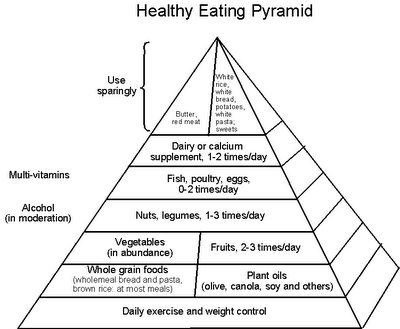Harvard Healthy Eating Pyramid in the News
Well, if you go to news.google.com and search for "Harvard Healthy Eating Pyramid" [HHEP] you aren't going to get any hits, but that doesn't mean that HHEP isn't in the news.
Taking a closer look at the HHEP, we can see it could be called:
the Low Glycemic Index/Load pyramid, limiting refined carbohydrates and encouraging vegetables and whole grains.
Taken a step further it could be called it the vegetarian pyramid - neither red meat nor poultry are required elements of the pyramid.
And going to the extreme, the HHEP makes a fine vegan pyramid simply by lopping off the top three HHEP tiers, a step which would not seem to bother the creators of the HHEP.
Which brings me to the following news stories:
First of all, there is a story I mentioned a couple of days ago; namely, the Australian Study on the effects a low glycemic index on weight loss. While it gets a bit confusing on who was fed what, the main take away is "in the high-carbohydrate diets, lowering the glycemic load doubled the fat loss. It was also noticed that LDL ... levels decreased in [a] diet with carbohydrates comprising 55 per cent of total energy intake, protein 15 per cent of total energy intake and a lower glycemic load (75g)". The Study concludes: "In the short term, our findings suggest that dietary glycemic load, and not just overall energy intake, influences weight loss." ["The short term" refers to the 12 week length of the study.]
And then there is this report from the American Diabetes Association that a vegan diet (no animal foods at all) out performed their own diet in terms of reducing the participants' use of diabetes related drugs at the end of the 22 week study period. In addition, those on the vegan diet lost twice the weight and had more success in lowering their cholesterol. I was, however, disappointed to see that part of the reason for the success of the vegan diet (including a 50% lower drop out rate) was that there was no limit at all on calories. While I understand that the main effort of the study was to see if diet could help control diabetes, from my own personal experience, I know you can have low cholesterol, normal glucose, eat nutritious food, yet still be obese, with all the attendant health problems. Control of calorie intake is a key parameter of good health, and my own refusal to take calories into account for over 6 years lead ultimately to the ICU.
My point here, of course, is that the Harvard Healthy Eating Pyramid is at the bottom of many food and nutritional studies going on today, all we have to do is look for it. The implication for anyone attempting to lose substantial amounts of weight is that for any number of reasons, the HHEP is as good a basis as you can get for starting to revamp your diet.
When I first began to try and lose weight I had never heard of the glycemic load, or transfats, or even of "whole" grains. Yet as a practical matter, by following the philosophy of "getting rid of" the one food I ate too much of, what I actually did was significantly reduce the glycemic load of my diet, as well as the transfats intake. As a resut I dropped 35 pounds, reduced my cholesterol from 220 to 155, and yet I remained obese because I refused to count calories, an incredibly simple step once I started.
It's unfortunate that the dynamics of behavorial change can usually prevent early adapation of something like the Harvard Healthy Eating Pyramid and calorie counting - I know in my case it could have saved me from atrial fibrillation, sleep apnea, heart failure, and pulmonary hypertension had I been able to shorten my contemplation and preparation phases. What could it save you from?

0 Comments:
Post a Comment
<< Home